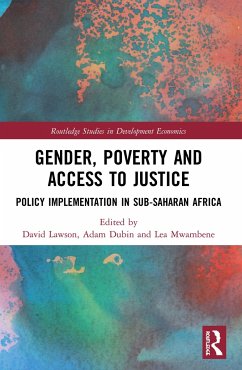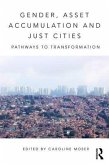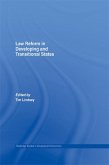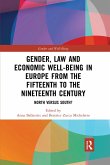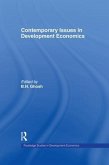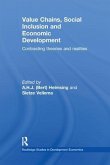Gender, Poverty and Access to Justice
Policy Implementation in Sub-Saharan Africa
Herausgeber: Lawson, David; Mwambene, Lea; Dubin, Adam
Gender, Poverty and Access to Justice
Policy Implementation in Sub-Saharan Africa
Herausgeber: Lawson, David; Mwambene, Lea; Dubin, Adam
- Broschiertes Buch
- Merkliste
- Auf die Merkliste
- Bewerten Bewerten
- Teilen
- Produkt teilen
- Produkterinnerung
- Produkterinnerung
Access to justice is a fundamental right guaranteed under a wide body of international, regional and domestic laws. This book brings together contributors to explore and analyze the issue of gendered access to justice, poverty and disempowerment across Sub-Saharan Africa.
Andere Kunden interessierten sich auch für
![Gender, Asset Accumulation and Just Cities Gender, Asset Accumulation and Just Cities]() Gender, Asset Accumulation and Just Cities50,99 €
Gender, Asset Accumulation and Just Cities50,99 €![Law Reform in Developing and Transitional States Law Reform in Developing and Transitional States]() Tim LindseyLaw Reform in Developing and Transitional States64,99 €
Tim LindseyLaw Reform in Developing and Transitional States64,99 €![New Directions in Development Economics New Directions in Development Economics]() New Directions in Development Economics51,99 €
New Directions in Development Economics51,99 €![Race, Class, Gender, and the Struggle for Social Justice in Higher Education Race, Class, Gender, and the Struggle for Social Justice in Higher Education]() Angela D. CaliseRace, Class, Gender, and the Struggle for Social Justice in Higher Education55,99 €
Angela D. CaliseRace, Class, Gender, and the Struggle for Social Justice in Higher Education55,99 €![Gender, Law and Economic Well-Being in Europe from the Fifteenth to the Nineteenth Century Gender, Law and Economic Well-Being in Europe from the Fifteenth to the Nineteenth Century]() Gender, Law and Economic Well-Being in Europe from the Fifteenth to the Nineteenth Century58,99 €
Gender, Law and Economic Well-Being in Europe from the Fifteenth to the Nineteenth Century58,99 €![Contemporary Issues in Development Economics Contemporary Issues in Development Economics]() Contemporary Issues in Development Economics70,99 €
Contemporary Issues in Development Economics70,99 €![Value Chains, Social Inclusion and Economic Development Value Chains, Social Inclusion and Economic Development]() Value Chains, Social Inclusion and Economic Development77,99 €
Value Chains, Social Inclusion and Economic Development77,99 €-
-
-
Access to justice is a fundamental right guaranteed under a wide body of international, regional and domestic laws. This book brings together contributors to explore and analyze the issue of gendered access to justice, poverty and disempowerment across Sub-Saharan Africa.
Hinweis: Dieser Artikel kann nur an eine deutsche Lieferadresse ausgeliefert werden.
Hinweis: Dieser Artikel kann nur an eine deutsche Lieferadresse ausgeliefert werden.
Produktdetails
- Produktdetails
- Routledge Studies in Development Economics
- Verlag: Taylor & Francis Ltd
- Seitenzahl: 222
- Erscheinungstermin: 22. Dezember 2021
- Englisch
- Abmessung: 234mm x 156mm x 12mm
- Gewicht: 344g
- ISBN-13: 9780367502799
- ISBN-10: 0367502798
- Artikelnr.: 62569811
- Herstellerkennzeichnung
- Libri GmbH
- Europaallee 1
- 36244 Bad Hersfeld
- gpsr@libri.de
- Routledge Studies in Development Economics
- Verlag: Taylor & Francis Ltd
- Seitenzahl: 222
- Erscheinungstermin: 22. Dezember 2021
- Englisch
- Abmessung: 234mm x 156mm x 12mm
- Gewicht: 344g
- ISBN-13: 9780367502799
- ISBN-10: 0367502798
- Artikelnr.: 62569811
- Herstellerkennzeichnung
- Libri GmbH
- Europaallee 1
- 36244 Bad Hersfeld
- gpsr@libri.de
David Lawson is Senior Researcher at The Nordic Africa Institute, Uppsala, Visiting Professor at The University of Helsinki and Associate Professor of Development Economics and Public Policy at the University of Manchester. He has 25 years of developing country public policy experience, particularly in relation to policy implementation and research on extreme poverty and gender, in SSA. He has published in leading development journals and consulted and advised extensively for the UNECA and World Bank. Adam Dubin is an Assistant Professor of Law in the International Public Law Department of Universidad Pontificia Comillas in Madrid, Spain, where he also directs a Master's program in International and European Business Law and a clinical program on human rights in Sub-Saharan Africa. He is also an Adjunct Professor of Politics at New York University's Madrid Campus, where he teaches Introduction to International Development an Comparative Human Rights Law. Dr Dubin has extensively consulted for organizations such as the UN and EU on human rights and development projects. Lea Mwambene is Professor of Law in the department of Private Law, and currently the Deputy Dean: Teaching and Learning of the Faculty of Law, University of the Western Cape, South Africa. Her teaching and research interests are in the general fields of African customary law and human rights. Driven by the genuine concern about the interaction between law, ideology and social practice, her recent research (with Ms Helen Kruuse from Rhodes University, South Africa) has included fieldwork in the Eastern Cape, South Africa, interviewing rural people about the impact of the reformed customary marriage laws in South Africa on the enjoyment of human rights by women and children.
List of illustrations. List of contributors. Foreword. Preface.
Acknowledgments. Part I. Access to justice in Sub-Saharan Africa: justice
policies on reaching the most vulnerable and extreme poor 1 Engendering
access to justice for the poorest and most vulnerable in Sub-Saharan
Africa. 2 Access to justice for children in Zimbabwe. 3 Children, forced
and early marriage: preventing and responding to early marriage in Uganda.
4 A child belongs to (s)he who has paid the bride price: customary law
adoption of children in Limpopo, South Africa. Part II. Women - violence
and vulnerability 5 Integrating gender and access to justice into the
public policy of the African Union. 6 Access to justice, gender and
customary marriage laws in Malawi. 7 Justice for women in traditional and
customary courts in Sierra Leone: a feminist analysis. 8 Engendering access
to justice in Nigeria: the role of public interest litigation. 9 Without
land, without justice: how women's lack of land rights impedes access to
justice. Part III. Advocacy and vulnerability for Sub-Saharan Africa's
poorest 10 Conflict-related sexual violence and access to justice: the case
of the Central African Republic. 11 Domestic violence against rural women
in Nigeria: effective access to justice? 12 Strengthening access to justice
for women refugees and asylum seekers in South Africa. 13 Conclusion:
gendered Justice Policies on Reaching the most Vulnerable and Extreme Poor
in SSA. Index.
Acknowledgments. Part I. Access to justice in Sub-Saharan Africa: justice
policies on reaching the most vulnerable and extreme poor 1 Engendering
access to justice for the poorest and most vulnerable in Sub-Saharan
Africa. 2 Access to justice for children in Zimbabwe. 3 Children, forced
and early marriage: preventing and responding to early marriage in Uganda.
4 A child belongs to (s)he who has paid the bride price: customary law
adoption of children in Limpopo, South Africa. Part II. Women - violence
and vulnerability 5 Integrating gender and access to justice into the
public policy of the African Union. 6 Access to justice, gender and
customary marriage laws in Malawi. 7 Justice for women in traditional and
customary courts in Sierra Leone: a feminist analysis. 8 Engendering access
to justice in Nigeria: the role of public interest litigation. 9 Without
land, without justice: how women's lack of land rights impedes access to
justice. Part III. Advocacy and vulnerability for Sub-Saharan Africa's
poorest 10 Conflict-related sexual violence and access to justice: the case
of the Central African Republic. 11 Domestic violence against rural women
in Nigeria: effective access to justice? 12 Strengthening access to justice
for women refugees and asylum seekers in South Africa. 13 Conclusion:
gendered Justice Policies on Reaching the most Vulnerable and Extreme Poor
in SSA. Index.
List of illustrations. List of contributors. Foreword. Preface.
Acknowledgments. Part I. Access to justice in Sub-Saharan Africa: justice
policies on reaching the most vulnerable and extreme poor 1 Engendering
access to justice for the poorest and most vulnerable in Sub-Saharan
Africa. 2 Access to justice for children in Zimbabwe. 3 Children, forced
and early marriage: preventing and responding to early marriage in Uganda.
4 A child belongs to (s)he who has paid the bride price: customary law
adoption of children in Limpopo, South Africa. Part II. Women - violence
and vulnerability 5 Integrating gender and access to justice into the
public policy of the African Union. 6 Access to justice, gender and
customary marriage laws in Malawi. 7 Justice for women in traditional and
customary courts in Sierra Leone: a feminist analysis. 8 Engendering access
to justice in Nigeria: the role of public interest litigation. 9 Without
land, without justice: how women's lack of land rights impedes access to
justice. Part III. Advocacy and vulnerability for Sub-Saharan Africa's
poorest 10 Conflict-related sexual violence and access to justice: the case
of the Central African Republic. 11 Domestic violence against rural women
in Nigeria: effective access to justice? 12 Strengthening access to justice
for women refugees and asylum seekers in South Africa. 13 Conclusion:
gendered Justice Policies on Reaching the most Vulnerable and Extreme Poor
in SSA. Index.
Acknowledgments. Part I. Access to justice in Sub-Saharan Africa: justice
policies on reaching the most vulnerable and extreme poor 1 Engendering
access to justice for the poorest and most vulnerable in Sub-Saharan
Africa. 2 Access to justice for children in Zimbabwe. 3 Children, forced
and early marriage: preventing and responding to early marriage in Uganda.
4 A child belongs to (s)he who has paid the bride price: customary law
adoption of children in Limpopo, South Africa. Part II. Women - violence
and vulnerability 5 Integrating gender and access to justice into the
public policy of the African Union. 6 Access to justice, gender and
customary marriage laws in Malawi. 7 Justice for women in traditional and
customary courts in Sierra Leone: a feminist analysis. 8 Engendering access
to justice in Nigeria: the role of public interest litigation. 9 Without
land, without justice: how women's lack of land rights impedes access to
justice. Part III. Advocacy and vulnerability for Sub-Saharan Africa's
poorest 10 Conflict-related sexual violence and access to justice: the case
of the Central African Republic. 11 Domestic violence against rural women
in Nigeria: effective access to justice? 12 Strengthening access to justice
for women refugees and asylum seekers in South Africa. 13 Conclusion:
gendered Justice Policies on Reaching the most Vulnerable and Extreme Poor
in SSA. Index.

